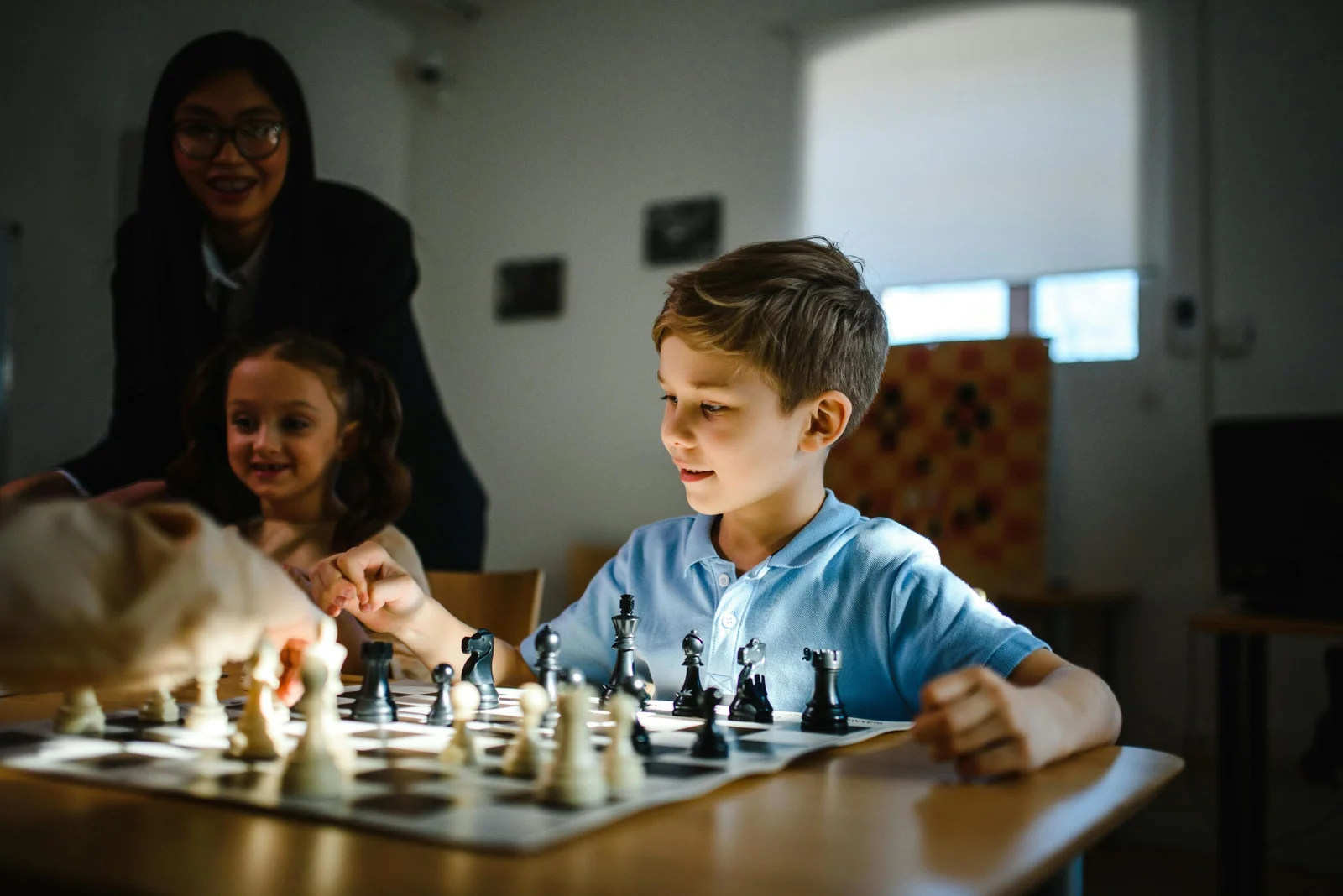
Chess is more than just a game—it’s a cognitive workout that enhances the mind in ways few other activities can match. For centuries, this strategic game has been celebrated for its ability to challenge the intellect and sharpen critical thinking. Today, scientific studies and anecdotal evidence alike confirm that chess can significantly boost cognitive skills, making it a powerful tool for personal development in both children and adults.
In this article, we’ll explore how chess impacts the brain, from improving memory and problem-solving to fostering creativity and focus.
The Science Behind Chess and Cognitive Development
Chess engages multiple areas of the brain simultaneously, offering a mental exercise that stimulates both hemispheres. Neuroscientists have found that playing chess increases activity in the prefrontal cortex, the area responsible for decision-making, problem-solving, and long-term planning.
Research also shows that chess enhances neuroplasticity—the brain’s ability to adapt and form new neural connections. This means that the more you play, the better your brain becomes at processing information, solving problems, and thinking critically.
Strengthening Memory Through Chess
One of the most immediate cognitive benefits of chess is its ability to improve memory. The game requires players to remember the positions of pieces, anticipate their opponent’s moves, and recall strategies and patterns from past games.
Short-Term Memory Boost
During a game of chess, short-term memory is put to work as players keep track of their opponent’s recent moves while planning their own. This constant exercise helps to strengthen memory retention, which is particularly beneficial for children in school and adults managing complex tasks.
Long-Term Memory Gains
Chess players also develop long-term memory by learning specific openings, tactics, and endgames. These memorized strategies help players navigate future games more effectively. The same skill can be applied in real-life situations that require recalling information over extended periods, such as academic study or professional work.
Enhancing Problem-Solving Skills
Chess is often called the “game of kings,” and for good reason—it requires solving complex problems under pressure. Every move in chess demands careful evaluation of options, potential risks, and the consequences of actions.
Strategic Thinking
Chess players must think several moves ahead, anticipating their opponent’s strategies and planning accordingly. This ability to plan and strategize improves decision-making skills, as it teaches players to weigh multiple factors before taking action.
Adapting to Challenges
No chess game ever goes entirely according to plan. Players must adapt to their opponent’s unexpected moves, fostering flexibility and creative problem-solving. This adaptability is a valuable skill in real life, where unexpected challenges often require quick thinking and resourceful solutions.
Developing Focus and Concentration
In a world full of distractions, chess offers a unique opportunity to build focus and concentration. Players must pay close attention to the board and think critically about their next move, often for extended periods.
Sustained Attention
Chess games can last anywhere from minutes to hours, requiring sustained mental effort. Regular practice helps players develop the ability to focus for longer periods, a skill that translates well into academics, work, and other areas of life.
Improved Multitasking
Chess players juggle multiple variables during a game: the position of pieces, potential moves, timing, and their opponent’s strategy. This mental juggling enhances multitasking abilities, allowing players to handle complex scenarios with greater ease.
Fostering Creativity and Innovation
While chess is rooted in logic and rules, it also requires creativity to outsmart opponents. Players must devise innovative strategies, recognize patterns, and think outside the box to achieve success.
Pattern Recognition
Chess teaches players to recognize recurring patterns, such as specific combinations of moves or tactics. This skill is not only crucial for success in the game but also has applications in problem-solving, coding, and artistic endeavors.
Imaginative Play
The game encourages players to think creatively, imagining hypothetical scenarios and exploring unconventional moves. This type of imaginative thinking can inspire innovation in fields ranging from engineering to art and design.
Building Emotional Resilience
Chess isn’t just a test of intellect; it’s also a test of character. The game requires emotional discipline, patience, and the ability to handle both victories and defeats gracefully.
Patience and Persistence
Chess players learn that success often comes from long-term effort rather than quick wins. This teaches patience and the value of persistence, skills that are invaluable in tackling long-term goals.
Handling Failure
In chess, every player experiences losses, sometimes due to a single mistake. Learning to analyze these losses and improve for future games builds resilience and a growth mindset, where failures are seen as opportunities to learn and grow.
Applications Beyond the Chessboard
The cognitive benefits of chess extend far beyond the game itself. Many of the skills developed through chess—such as critical thinking, memory, and focus—are directly applicable to academics, work, and personal relationships.
Academic Success
Studies have shown that students who play chess often perform better in math, reading, and standardized tests. The strategic thinking and problem-solving skills learned through chess translate into stronger academic performance.
Professional Growth
In the workplace, the ability to think critically, adapt to challenges, and make strategic decisions is invaluable. Chess helps professionals hone these skills, making them more effective leaders and problem-solvers.
Everyday Life
From managing finances to resolving conflicts, the lessons learned from chess—such as planning, patience, and adaptability—can improve decision-making and enhance daily life.
Conclusion: A Game for the Mind and Beyond
Chess is more than just a game; it’s a powerful tool for developing cognitive skills that last a lifetime. By engaging the brain in strategic thinking, memory recall, and creative problem-solving, chess helps players sharpen their minds while building focus, resilience, and adaptability.
Whether you’re a child learning the basics or an adult honing advanced strategies, playing chess offers countless benefits that extend far beyond the board. For anyone looking to supercharge their brainpower and enhance their mental agility, chess is a game worth mastering.

